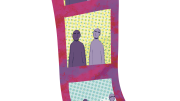In September 1983, the GNU Project was born. GNU was to be a new kind of operating system: the first one with an explicit ethical goal.
Perhaps a little background is needed. GNU stands for “GNU’s Not Unix.” Unix was an operating system (OS) that was in common use at the time, and the recursive acronym is a bit of programmers’ humour. The project emerged from the hacker culture at MIT, which had collapsed at the end of the 1970s when a technology company hired all but a few of the programmers.
One of these few, a programmer named Richard Stallman, was dismayed at the encroachment of commercial interests on the programming world. Source code, which was once shared like recipes among friends, was increasingly kept under lock and key like the KFC herbs and spices. Commercial software now imposed restrictions on how it could be used and distributed – in some cases, simply to run the software you were required to sign a non-disclosure agreement.
Stallman set out to combat this by creating software that explicitly granted the user certain rights he believed they should have: the right to run the software for any purpose, to access and modify the source code, and to redistribute copies or modified versions of the software. Since one of the most basic pieces of software required for computing is the OS, he began his project by developing a Unix-compatible OS.
In the process of creating his OS, Stallman developed several pieces of software that have endured for decades and are still used today, such as GNU Emacs and the GCC compiler. He also developed the GNU General Public License (GPL), the terms under which this software was to be distributed, which guaranteed users’ rights and prevented anyone from making proprietary versions of the software.
But the GNU OS was never finished as such. By 1990 many of the components were being used by Unix users. One major component remained undone, however: the kernel. Stallman and company began work on their kernel, known as GNU Hurd, but it ran into problems and still is not complete. Instead, they incorporated Linux, a Unix-like kernel licensed under the GNU GPL, into their code to form what they call GNU/Linux.
GNU/Linux distributions (“distros” for short) such as Slackware, Ubuntu, and Red Hat Fedora are still being created and maintained today. They are in common use among programmers, computer scientists, and others who need their computers to perform specialized tasks. The University of Manitoba has a number of computers running Linux in its computer labs.
The GNU Project eventually grew into the free software movement. “Free,” in this case, does not refer to price: the motto is “‘free’ as in ‘free speech,’ not as in ‘free beer.’” The Free Software Foundation (FSF) has grown to be influential and has seen some major successes in advocating for the ideals enshrined in the GPL. Some free software programs, such as Mozilla Firefox and OpenOffice.org, have become household names.
The work of the FSF and people associated with the movement represents a kind of ethical triumph. The problem is nobody uses the software. The various Linux distros make up a minuscule portion of the market, with Windows overwhelmingly dominant and Mac OS X as a very distant second. Firefox, which was at one time the shining example of free software gaining popular success, is not the Internet Explorer slayer we once hoped – it appears as though that role is being filled by Google Chrome.
On the office software front, the vast majority of corporate and individual users use Microsoft’s office suite. OpenOffice.org, the best competitor available, has a powerful word processor and a respectable spreadsheet program, but its alternative to PowerPoint is a joke. The OpenOffice.org project has undergone some background troubles in the last few years: it was acquired by the software company Oracle and then discontinued, and has been revived as two separate projects known as LibreOffice and Apache OpenOffice.
So despite free software’s ethical superiority, it does not provide a real challenge to proprietary software except in a few narrow fields (the world’s 44 fastest supercomputers all run Linux, for example). Free software has apparently failed to capture the hearts and minds of the people, even in those areas (such as, arguably, OS design) in which it is superior to the proprietary alternative.
This is because ethics and quality are not the only factors we consider when choosing software. There are very real costs associated with trying something new—your files might be unreadable, you may not be able to use certain kinds of hardware, you have to learn to use the new system—so an inferior software package that is familiar might still be a more practical option than a functionally superior but new and unproven technology. There is some value in doing what everyone else is doing.
Over and above the issue of unfamiliarity, Linux distros tend to assume a much greater knowledge of the operations of computers than other OS software. Though there is something to be said for the old-school mindset that a computer is a tool you learn how to use, rather than a servant that automatically adapts itself to your needs, we can’t expect everyone to become intimately acquainted with the operations of their computers. At some point actual work needs to get done.
As Stallman himself points out, computer hobbyists are analogous to car tinkerers. Your custom-built hot rod may well be a superior car, but it does not answer the needs of the delivery company with a fleet of a thousand trucks or the little old lady who only drives to church every Sunday.
There are certain practical advantages to free software, of course. It tends to encourage the growth of communities of users. Having access to the source code makes it easier to diagnose and fix problems. The ability to distribute modified versions allows programmers to recycle code that has already been written for new purposes.
To get these advantages, however, it is not necessary to subscribe wholesale to FSF philosophy. This is where the Open Source Initiative (OSI) comes in. The OSI was founded to promote open-source software, which is essentially the same thing as free software only with an emphasis on practical benefits rather than ethics. The FSF remains opposed to the idea of open-source software, which they see as missing the point: software should be free because it should be free, not because it’s useful for it to be free.
An open-source philosophy allows free software to exist more comfortably in a commercial environment, which in turn can give it the promotion and support that it needs in order to succeed on a wider scale – witness the success of Ubuntu for a quintessential example.
But these projects are only successful because and to the extent that they capitulate to commercial interests. Ubuntu includes some non-free code that allows it to work with certain types of hardware. One of the essential programs on any Linux box is Wine, which allows you to run software designed for Windows if there is no suitable Linux version available.
Wine is a cop-out, but it’s a necessary cop-out for people who want to get anything done. This is the crux of the issue: in many cases, the goals of expediency and ethics cannot be reconciled, and you have to pick one or the other. Especially in cases where the issues are nebulous and hard to understand, ethical integrity can seem like a luxury, something that’s nice to have but by no means necessary for a practical person.






“Wine is a cop-out, but it’s a necessary cop-out for people who want to get anything done.” Do you have any data to back-up that claim? It seems like an absurd claim to me, since over the past decade of interacting with a lot of free software users, I have come across very few instances where individuals rely on Wine on a regular basis.
I record music and sports podcasts, and made it through law school, using just GNU/Linux. I guess that’s not getting anything done though. Playing proprietary video games, now that is getting something done!